
ICAS Bulletin (online ISSN 2836-3418, print ISSN 2836-340X) is published every other week throughout the year at 1919 M St NW, Suite 310, Washington, DC 20036.
The online version of ICAS Bulletin can be found at chinaus-icas.org/bulletins/.
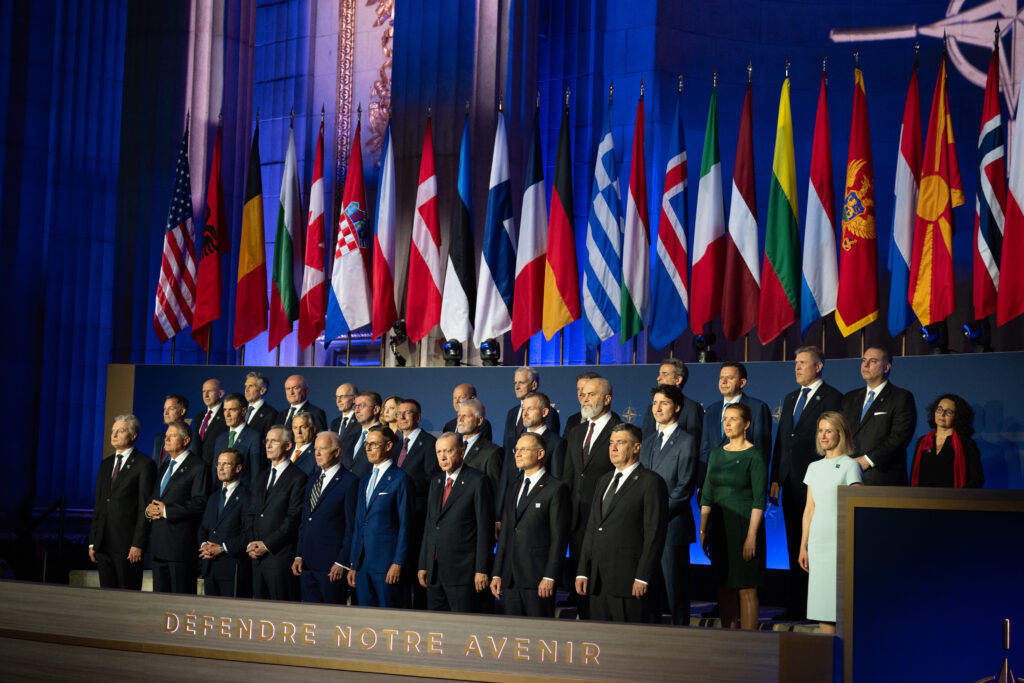
– NATO released a communiqué on July 10 that called China a “decisive enabler” of Russia’s war efforts in Ukraine. The communiqué called on Beijing “to cease all material and political support to Russia’s war effort.”
– China’s Foreign Ministry spokesperson responded to the communiqué one day later. He said that NATO’s claim on “China’s responsibility on the Ukraine issue is unreasonable” and urged NATO to “not create chaos in the Asia-Pacific.”
– On July 9, Sweden’s Foreign Minister said that NATO should focus more on China to “show commitment to… the U.S.’s problems” in order to ensure U.S. support for the alliance.
– South Korea, Japan, New Zealand, and Australia attended the NATO Summit in Washington, D.C., held July 9-11, for the third consecutive year to enhance Indo-Pacific cooperation with NATO allies due to their growing security concerns over China.
– In response to this deepening Asia-Pacific cooperation, China’s Foreign Ministry spokesperson accused NATO for “breaching its boundary…[and] reaching beyond its defense zone.”
Associated News References:
“China tells NATO not to create chaos in Asia and rejects label of ‘enabler’ of Russia’s Ukraine war,” ABC, July 11
“NATO allies call China a ‘decisive enabler’ of Russia’s war in Ukraine,” AP, July 10
“Sweden Asks NATO To Focus More On China To Win US Support,” Barron’s, July 9
“To counter China, NATO and its Asian partners are moving closer under US leadership,” ABC, July 9
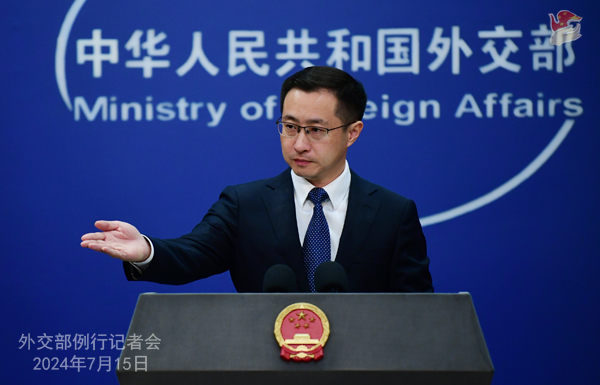
– On July 15, the Chinese Ministry of Commerce said that, following unsuccessful consultations with the U.S., China has requested the World Trade Organization to set up a panel for dispute settlement over electric vehicle subsidies provided in the Inflation Reductionary Act.
– The Chinese Foreign Ministry expressed strong opposition to the Tibet Dispute Act signed by President Joe Biden on July 12 that pushes Beijing to resolve its dispute with Tibet. The Ministry warned that “the U.S. must not implement the Act.”
– On July 12, the Chinese Foreign Ministry announced that it is sanctioning six American defense companies and senior executives over their involvement in the recent U.S. arms sale to Taiwan, stating that the arms sale “seriously violates the one-China principle.”
– On July 10, the U.S. Coast Guard reported detecting four Chinese military vessels in international waters that are within the U.S. exclusive economic zones near Alaska. The report said that the Chinese vessels claimed that their purpose was “freedom of navigation operations.”
– On the same day, Taiwan’s Defense Ministry observed 56 Chinese People’s Liberation Army (PLA) aircrafts crossing the U.S.-drawn border in the Taiwan Strait. This move directly followed news that Taiwan’s President Lai Tsing-te is considering a visit to the U.S.
Associated News References:
“China asks WTO to set up panel for US electric vehicle subsidies dispute,” Reuters, July 15
“China blasts US Tibet-China dispute bill, vows to defend its interests,” Reuters, July 13
“China Sanctions Six US Defense Companies for Taiwan Arms Sale,” Bloomberg, July 12
“US Coast Guard patrol spots Chinese naval ships off Alaska island,” ABC, July 11
“China Sends Most Warplanes Ever Across Key Line With Taiwan,” Bloomberg, July 10
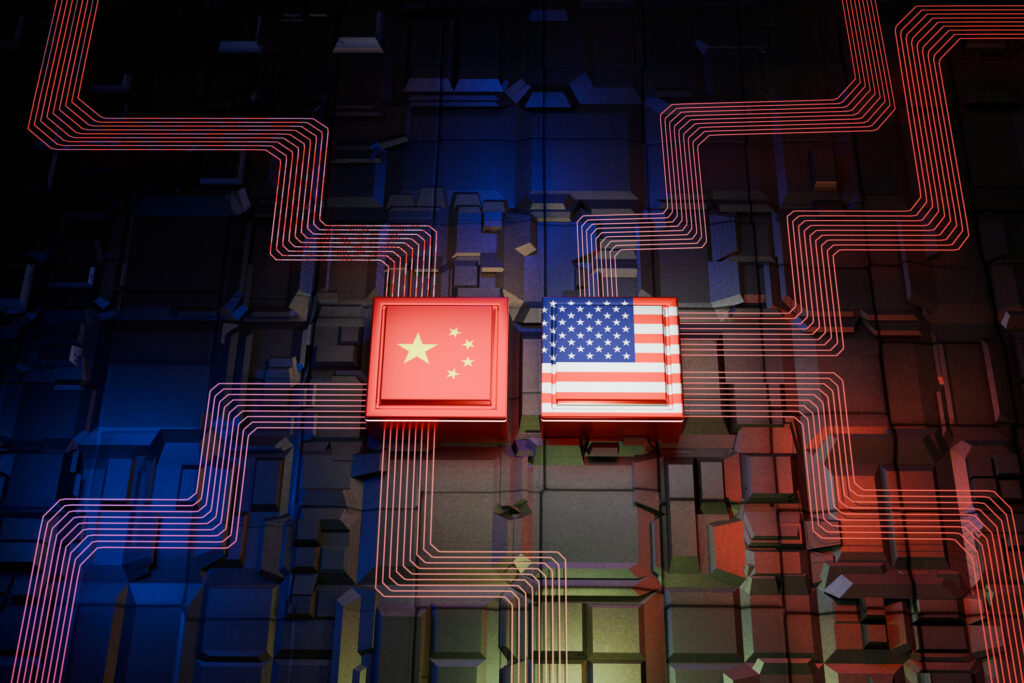
– The Biden administration has announced a $1.6 billion funding competition for chip packaging research and development (R&D). This announcement marks the largest funding opportunity to date from the $11 billion allocated to domestic R&D in the 2022 CHIPS Act.
– The Head of U.S. Energy Department’s Office of Fusion Energy Sciences said that China is outspending the U.S. government budget by nearly two-fold in developing commercial fusion technology.
– In an interview with BNR, the former CEO of ASML said that the U.S.-China semiconductor competitions are conducted “on the basis of ideology,” and predicted that the chip war will continue in the near future.
– To mitigate security risks associated with China, the Biden administration is developing semiconductor assembly and packaging industries in countries such as Costa Rica, Indonesia, and Mexico to strengthen U.S. supply chain security.
– A UN report on July 4 showed that China has led the global patent race on generative AI, filing more than 38,000 patents between 2014 and 2023. This number is six times higher than those filed by U.S. inventors.
Associated News References:
“US Opens $1.6 Billion Competition for Chip Packaging Research,” Bloomberg, July 9
“China Outspends the U.S. on Fusion in the Race for Energy’s Holy Grail,” The Wall Street Journal, July 8
“Former ASML CEO says US-China chip fight will continue,” Reuters, July 8
“U.S. Creates High-Tech Global Supply Chains to Blunt Risks Tied to China,” The New York Times, July 8
“China leads the patents race for generative AI, with Tencent and Baidu topping the list,” CNBC, July 4
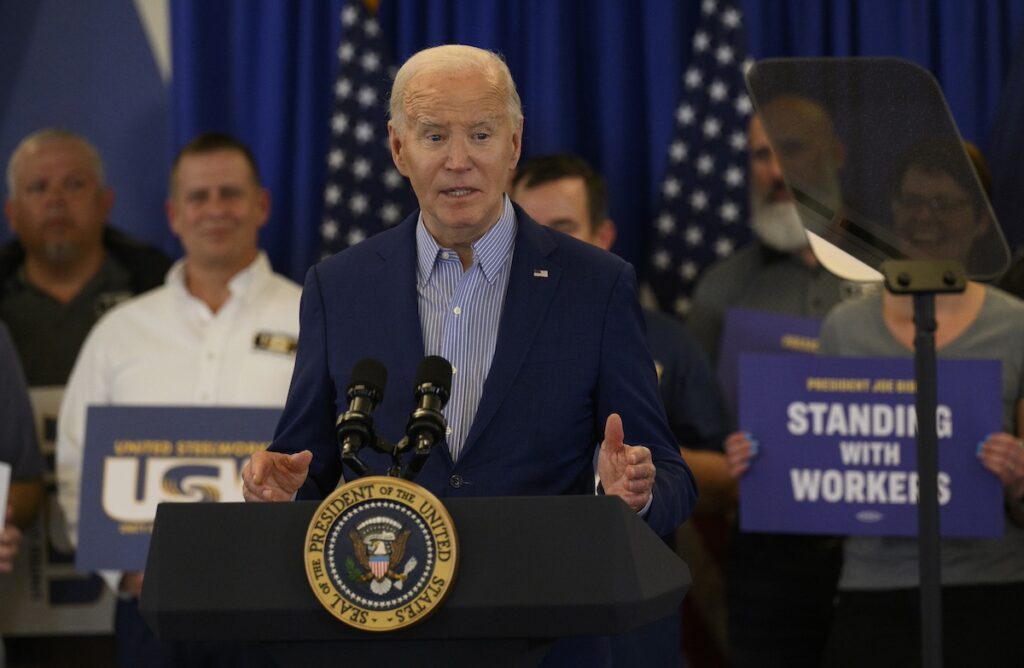
– In an interview with Fox News on July 15, presidential nominee Donald Trump’s newly announced running mate J.D. Vance said that Trump, if elected, would resolve the Ukrainian war rapidly in order for the U.S. to focus on “the biggest threat to…[the U.S.] which is China.”
– The Biden administration announced new measures on July 10 that would apply 25% tariffs to steel and 10% tariff on aluminum from Mexico if the imports were not produced in Mexico. This measure targets Chinese shipments that were diverted to Mexico with the aim to circumvent levies.
– President Biden has proposed a 25% tariff on Chinese ship-to-shore cranes to incentivize the development of domestic alternatives and reduce reliance on Chinese companies.
– On July 9, the United States and its allies released a report that said that Advanced Persistent Threat 40, a China-based cyber hacking group also known as APT40, had repeatedly conducted “malicious cyber operations for the PRC ministry of State security” and have targeted governments across the Indo-Pacific.
Associated News References:
“Trump VP Pick Vance Says China Is the ‘Biggest Threat’ to US,” Bloomberg, July 15
“US Targets China With Tariffs on Steel, Aluminum Sent Via Mexico,” Bloomberg, July 10
“Biden wants to cut U.S. need for Chinese cranes; ports fear higher costs,” The Washington Post, July 9
“US, Allies Accuse China’s Spies of Directing Cyberattacks,” Bloomberg, July 8

– The Chinese TV singing competition “Singer 2024” has sparked national sentiment across Chinese social media platforms, with the discussions centered around upholding “national honor” against American artists who have consistently outperformed their Chinese counterparts in the show.
– On July 11, a U.S. appeals court found insufficient evidence for the conviction of Feng Tao, a professor who was convicted in 2022 for alleged involvement in Chinese economic espionage under ex-President Donald Trump’s “China Initiative.”
– A recent Pew Research survey showed that, across 18 high-income countries, more than twice as many people viewed the U.S. positively compared to those who viewed China positively. However, the two countries are viewed equally favorably in middle-income countries.
– At the World Peace Forum in Beijing, a Chinese scholar from Tsinghua University said that China and the U.S. may “have reached a limit on the…extent [to which they can]…stabilize this bilateral relations.”
– On July 7, Texas governor Greg Abbott announced that a Texas-Taipei Trade representative office will be established in Taipei to strengthen economic and business ties between Texas and Taiwan.
Associated News References:
“U.S.-China rivalry enters a new sphere: Who can best carry a tune,” The Washington Post, July 12
“Kansas researcher wins reversal of conviction in Trump-era China probe,” Reuters, July 11
“US Favored Over China in Dozens of Countries, Pew Survey Says,” Bloomberg, July 10
“Chinese Scholars See Little Room to Improve US Relationship,” Bloomberg, July 7
“Greg Abbott Opens Texas-Taiwan Office,” Newsweek, July 7

“The next front in U.S.-China tech battle? Underwater cables that power the global internet,” CNBC, July 16
“ASML-Backed University Caught in Middle of US-China Chips War,” Bloomberg, July 15
“Exclusive: White House should disclose whether Russia sharing US weapons insight with China, says Congress,” Reuters, July 15
“Trump’s ‘luck’ and American ‘violence’ are the talk of China’s internet,” CNN, July 15
“‘Trump Wins Big’ Meme Stock Surges in China.” Bloomberg, July 14
“Fears of China-owned farmland in Wisconsin and US are exaggerated, new analysis suggests,” Wisconsin State Farmers, July 12
“Solomon Islands and China are strengthening ties in a worrying move for US and its Pacific allies,” AP, July 12
“US Places Visa Curbs on Some Chinese Officials for Alleged Abuse,” Bloomberg, July 1
“US renews call on China to stop aggressive actions in disputed sea, where hostilities have flared,” AP, July 12
“US, Canada and Finland form ‘Ice Pact’ to project influence into Arctic region,” The Guardian, July 11
“US lawmakers raise worries about China in Microsoft deal with Emirati AI firm,” Reuters, July 11
“New top US envoy to Taiwan pledges to help the island with self-defense as threats from China loom,” ABC, July 10
“Solar Firm Gets Millions in US Tax Credits Despite Chinese Labor Questions,” Bloomberg, July 9
“Temasek to prioritise US deals and stay cautious on China,” Financial Times, July 9
“US Treasury’s Yellen: China AI investment restrictions are narrowly targeted,” Reuters, July 9
“Chinese Student Pleads Guilty To Espionage Drone Pics,” Law360, July 8
“Exclusive: U.S. Voters Value Safe AI Development Over Racing Against China, Poll Shows,” TIME, July 8
“Hungary’s PM travels to Washington after talks with China’s Xi,” Reuters, July 8
“Microsoft Orders China Staff to Use iPhones for Work and Drop Android,” Bloomberg, July 8
“US, Australia commit to better Pacific banking as China influence grows,” Reuters, July 8
“Exclusive: Philippines turned down US help amid South China Sea tensions – military chief,” Reuters, July 5
“World Anti-Doping Agency ‘disappointed’ at US investigation into Chinese doping case,” AP, July 5
“Nvidia to make $12bn from AI chips in China this year despite US controls,” Financial Times, July 4
July 11 hosted by Global Institute for Tomorrow
July 11 hosted by Center for Strategic & International Studies
July 8 hosted by Heritage Foundation
July 4 hosted by South China Morning Post
July 18 hosted by Center for Strategic & International Studies
July 25 hosted by Asia Society
July 26 hosted by Center for Strategic & International Studies
July 30 hosted by Asia Society
ICAS is Looking for a Part-Time Intern for Fall 2024!
The internship will run from early-September through mid-December. This is a part-time, 20 hour per week internship that will primarily be conducted in-person at the ICAS office in Washington, DC. Competitive candidates will have an interest in U.S.-China relations and are pursuing a bachelor’s degree from an accredited institution, though those pursuing a relevant master’s degree will also be considered.
Dr. Nong Hong participates as a panelist at CSIS’ 14th Annual South China Sea Conference
July 11, 2024
On Thursday, July 11, 2024, ICAS Executive Director and Senior Fellow Dr. Nong Hong joined as a panelist at the 14th Annual South China Sea Conference, presented by the CSIS Southeast Asia Program and Asia Maritime Transparency Initiative in Washington, D.C.
Dr. Hong spoke in “Session 1: State of Play in the South China Sea” alongside three other expert panelists, who discussed and traded opinions on the current state of the situation in the South China Sea. A full video recording of this panel discussion is available.
Sourabh Gupta participates as a panelist in a World Salon event on
“The Global Implications of the Post-COVID China Supply Shock”
July 6, 2024
China’s recent post-COVID manufacturing and export surge, particularly in renewable energy technologies, electric vehicles, and steel, has intensified global competition. It is crucial to understand what is driving this surge and its implications for the world. The four panelists shared their insights on China’s post-COVID manufacturing surge, with enlightening and impactful discussions on renewable energy technologies, electric vehicles, and exports.
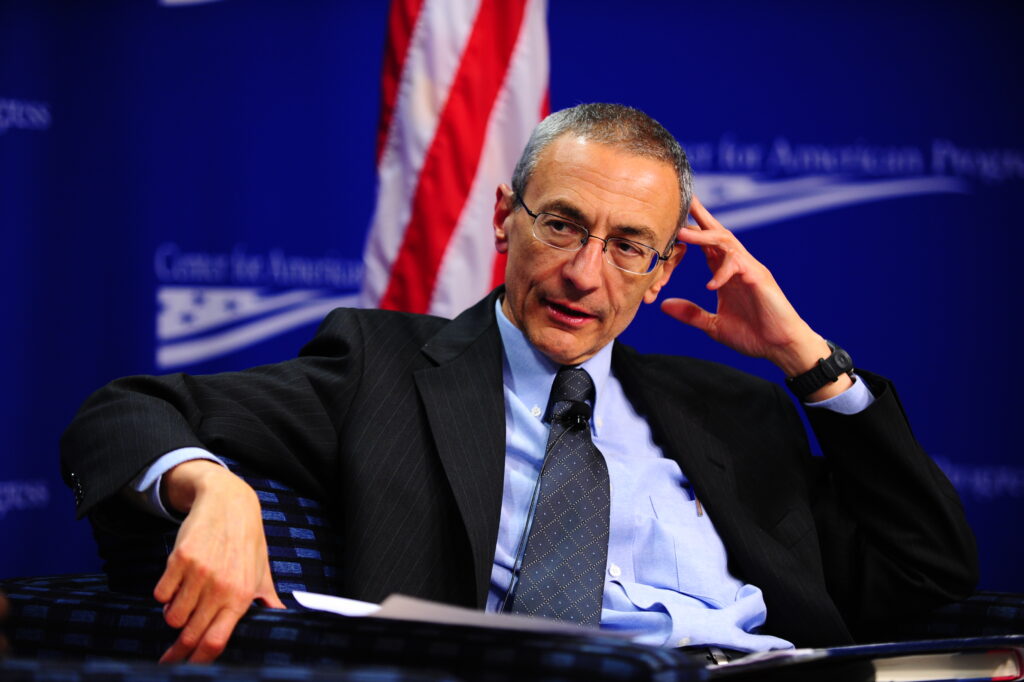
U.S. Proposed Carbon Border Tax: Protectionism Disguised as Environmental Policy
By Zhangchen Wang
July 16, 2024
In a recent interview with Financial Times, John Podesta, U.S. Senior Advisor to the President for International Climate Policy, indicated that the U.S. is exploring a range of options for carbon pricing on imports to combat “freeriding” by foreign producers of carbon-intensive goods…
The ‘carbon tariff’ is no longer an innovative concept…However, the carbon tariff discussed by Podesta differs fundamentally from its CBAM counterpart…Especially given the severe trade friction between the United States and China, the imposition of these potential carbon tariffs may merely be a new form of trade protectionism disguised as environmental policy.
Global Times Interview: China’s ‘economic miracle’ was forged under conditions of openness
By Sourabh Gupta
July 12, 2024
In the eighth article of the series, Global Times (GT) reporter Qian Jiayin talked with ICAS Senior Fellow Sourabh Gupta (Gupta).Gupta noted that China’s “economic miracle” was forged under conditions of openness, and high-quality development of the economy too will need to be carried out under open conditions. China has already made strides on these fronts but the pace, at the moment, needs to be accelerated.
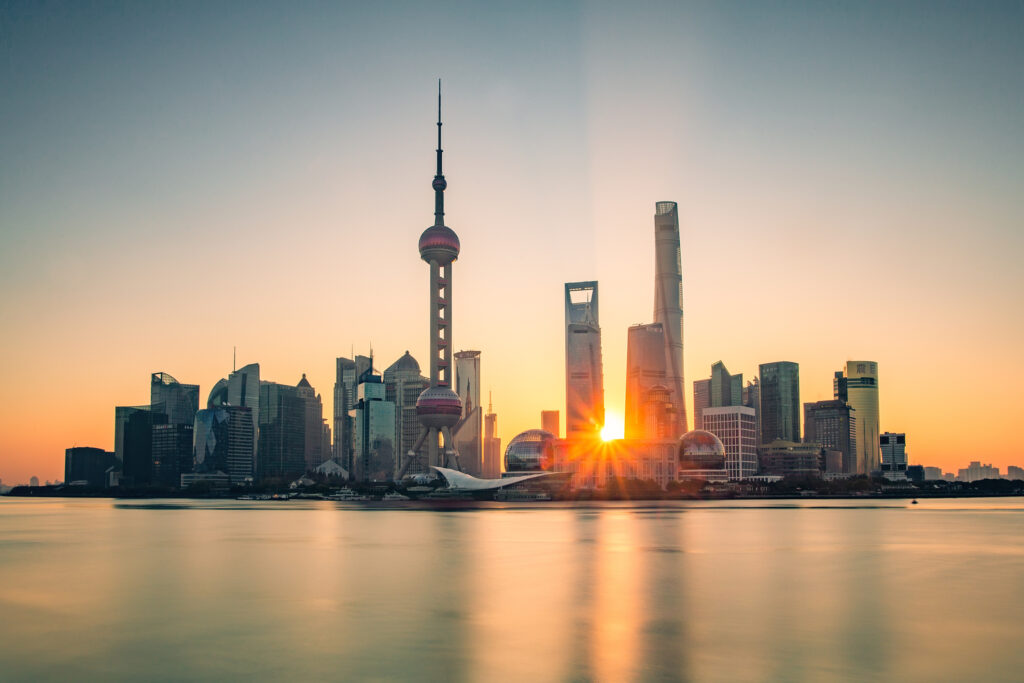
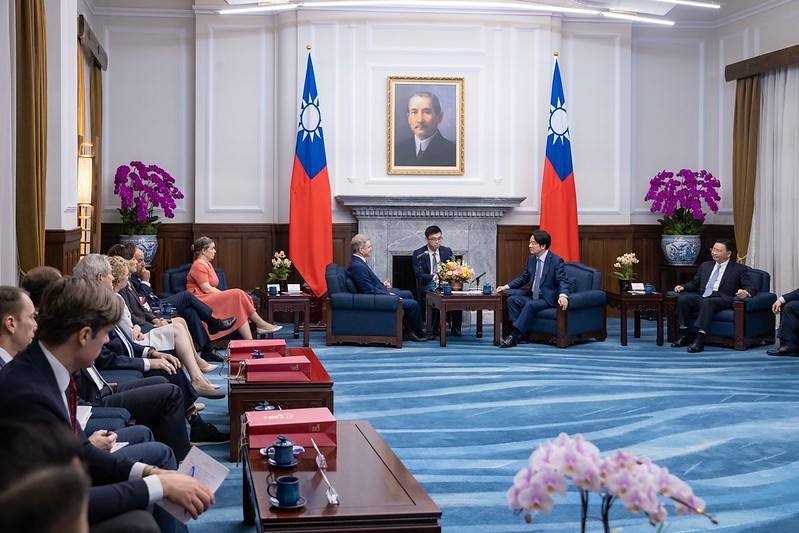
U.S. Congressional Visits Jeopardize Taiwan’s Interests, and Its Own
By Wyatt Huang
July 10, 2024
Since Nancy Pelosi visited Taiwan in 2022—the first U.S. House Speaker visit since 1997—U.S. lawmakers in various congressional roles have made increasingly more frequent visits to Taiwan, nearly doubling their frequency from 2022 to 2023. U.S. lawmakers have framed congressional visits as a necessary move to “underscore and reaffirm…[the U.S.’s] strong bipartisan support for the Taiwanese people.” Yet, despite these intentions, these visits ultimately contradict the priorities of Taiwan’s democratic will and hurt U.S. strategic interests.
On Friday, July 5, 2024, Senior Fellow Sourabh Gupta was quoted by Inside U.S. Trade on the expected economic focus areas at China’s upcoming Third Plenum.
On Wednesday, July 3, 2023, Senior Fellow Sourabh Gupta was interviewed by Sputnik International on The Final Countdown radio show to discuss China’s alleged spy bases in Cuba.

The Institute for China-America Studies is an independent nonprofit, nonpartisan research organization dedicated to strengthening the understanding of U.S.-China relations through expert analysis and practical policy solutions.
1919 M St. NW Suite 310,
Washington, DC 20036
icas@chinaus-icas.org
(202) 968-0595
© 2025 INSTITUTE FOR CHINA-AMERICA STUDIES. ALL RIGHTS RESERVED.